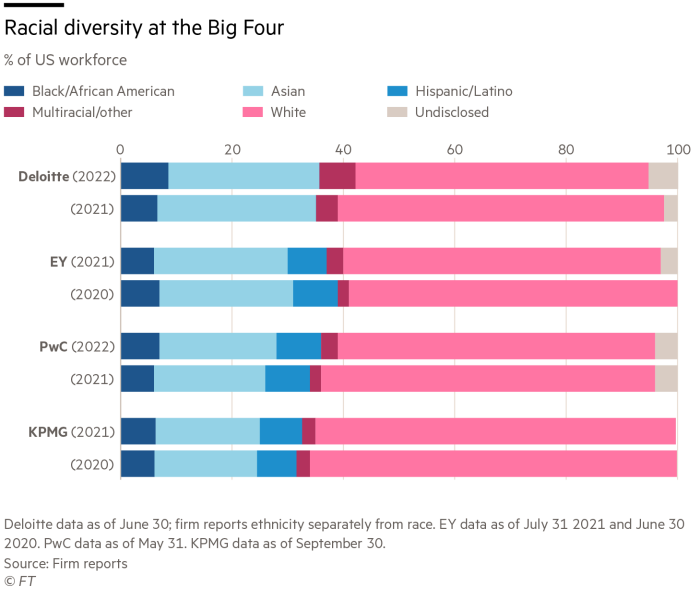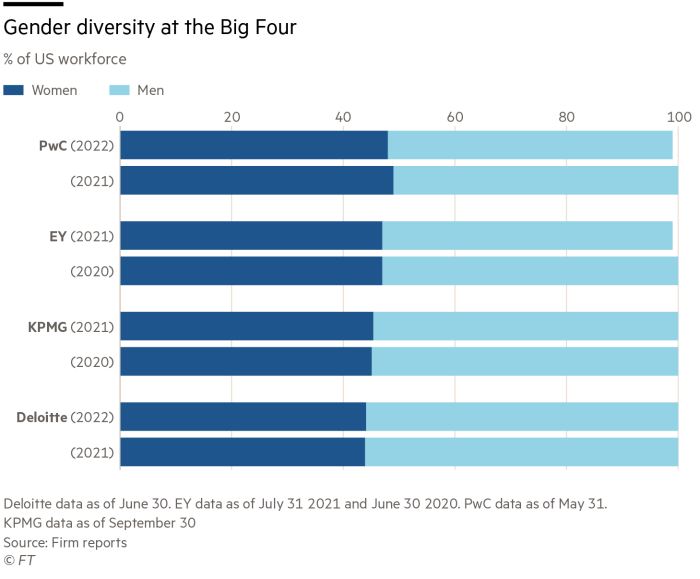
Deloitte has the most racially diverse workforce of the Big Four accounting firms in the US, an analysis of diversity and inclusion reports shows, following a hiring spree that swelled its employee numbers by almost a quarter.
Rival PwC, meanwhile, ranks as having the greatest percentage of female employees among the four firms, based on numbers it published on Monday, but the increase in women in the workforce has stalled.
The Big Four have touted progress towards diversity goals as they engage in a war for new recruits, but their latest reports continue to show significant underrepresentation of women and people from minority groups, particularly at the higher echelons of the firms. They also suggest that diverse candidates are not being promoted in sufficient numbers to quickly close the gap.
At Deloitte, the largest of the four firms, 42 per cent of its now 80,000-strong US workforce identify their race as other than white, up 3 percentage points on a year ago. At EY, 40 per cent identify as other than white, down from 41 per cent, while at PwC it is 39 per cent, up 3 percentage points in a year. At KPMG, the smallest of the big four, 35 per cent identify as other than white.
By another measure, Deloitte says the overall percentage of racial and ethnic diversity at the firm is 47 per cent. It asks employees for their ethnicity and race separately.

By contrast, figures for female employment put Deloitte at the bottom of the quartet, with women accounting for 44 per cent of its workforce compared with 45 per cent at KPMG, 47 per cent at EY and 48 at PwC.
Although it tops the Big Four, the percentage of women in the PwC US workforce fell from 49 per cent last year, and only 47 per cent of entry-level hires were female, far from its goal of reflecting the 56.5 per cent of US higher education enrolments.

Ahead of the publication of its annual diversity report on Monday, Shannon Schuyler, chief purpose and inclusion officer of PwC US, said minority employees were still failing to be promoted in sufficiently large numbers to close gaps at higher levels of the firm.
The number of black employees at PwC US rose from 6 per cent to 7 per cent, but they accounted for 5 per cent or less of the promotions from associate and senior associate level in the past year.
“If you move people up proportionately, or slightly lower, than that you’re never going to achieve a change in representation,” Schuyler said. “This past year has been about working to engage the majority . . . because they need to be a part of this and they need to realise that it’s not a zero-sum game.”
Among PwC’s US partners, 18 per cent identify as other than white, while the figures are 17 per cent and 15 per cent at EY and KPMG respectively. Deloitte does not split out partners in its diversity report.
The firms have slightly different methodologies and lags to reporting their data.
Deloitte and PwC use their fiscal year-ends in May and June 2002 respectively, while EY’s report this year presented figures as of July 2021. KPMG’s most recent diversity report was published in December, referencing data from September 2021.